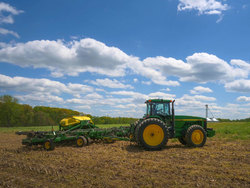Agripulse | 22 March 2023
Ag groups taking hands-off approach on foreign farmland ownership Major farm groups are largely staying on the sidelines for now as lawmakers wrestle with constituents' concerns that China and other foreign interests are buying up U.S. cropland and threatening the nation's food security.As producers gathered to update the policy stances of their respective organizations during the recent “meeting season” stretching from January through early March, a commonality emerged during discussions about foreign entities purchasing U.S. farmland.
If a resolution on the subject was brought forward, it would usually be watered down from its original text or not pass at all.
The trend is a striking contrast with Capitol Hill, where the concern about foreign purchases of American ag acreage and the Agriculture Department’s enforcement of existing law to track it is setting up to be one of the hottest farm policy issues of the year.
A survey of a selection of the nation’s leading farm organizations turned up very few ironclad objections. The National Farmers Union was an exception, though, with policy supporting a prohibition on foreign interests buying “U.S. agricultural lands, holding federal grazing allotments or commercial fishing privileges.”
Now, heading into the final stages of policy formulation before the next farm bill, many organizations either have limited positions or no policy at all.
National Cattlemen’s Beef Association members, for example, were faced with the reality that a desire to halt overseas investment in U.S. farmland could result in restrictions on land sales. Mary-Thomas Hart, the NCBA staffer charged with overseeing the group’s property rights committee, said the issue also raises complex questions about state and federal jurisdiction.
“There are a number of states across the country that have already implemented state laws based on foreign ownership or foreign acquisition of farmland or ag land,” Hart said. “So where do we draw that line? Do we want to leave that to states to make the decision? Or do we want the federal government to step in? I think those are all going to be parts of this conversation.”
NCBA members ultimately voted in favor of a resolution to encourage the addition of the Secretary of Agriculture to the Committee on Foreign Investment in the United States, a route also favored by some on Capitol Hill to address the issue.
At the recent Commodity Classic, members of the National Corn Growers Association voted down an effort to add opposition to foreign farmland purchases to the group’s policy book.
The American Soybean Association's members also voted down an outright ban on foreign purchases, but did support federal legislation "governing foreign ownership of agricultural land and business that protects U.S. farmers, consumers, national security, and economic interests without limiting soybean industry research or market access.” The latter language was aimed at avoiding a multi-state framework on the issue as legislatures across the country consider the approach in their own respective states.
During the policy discussion and in interviews with Agri-Pulse, leaders of the groups have expressed concern about wording potentially limiting the usage of acres in the United States by foreign-owned agribusinesses seeking to conduct trials or regulatory testing.
“A lot of (the foreign-owned companies) probably had a lot of that land bought before they were consolidated with a foreign owner,” NCGA President Tom Haag said in an interview.
ASA President Daryl Cates said the group decided it did not “want to stifle the land that (those companies) have for research.”
A spokesperson for Syngenta, which was acquired in 2017 by the state-owned ChemChina, said the company’s landholdings in the United States are “used primarily for research required by regulators for product registrations, variety trials and demonstrations that support products we produce for U.S. farmers, or as employee workplaces.”
Several producers also noted the potentially thorny issue of naming certain countries that should be barred from purchasing U.S. acres — most notably China, which holds a relatively small share of total U.S. foreign landholdings — while still courting their business on the global commodities market.
A spokesperson for the National Association of Wheat Growers said the group’s members have discussed the issue but have yet to adopt an official policy.
The American Farm Bureau Federation’s 2023 policy resolutions included one that said, “Given the complexities and issues surrounding foreign investment and ownership of American farmland, American Farm Bureau Federation should evaluate the impacts for purposes of policy recommendation.” A spokesperson said the organization also supports the Ag Secretary’s inclusion on CFIUS.
The issue was not on the agenda at a recent gathering of National Pork Producers Council members, and the group has no existing policy on the matter, nor does the National Cotton Council or USA Rice Federation.
The issue has confounded lawmakers on Capitol Hill and officials at USDA. Laws are already on the books to track foreign farmland ownership, but USDA fines for violations of the law have plummeted even as transactions have surged. A recent debate about a Chinese company’s plans to build a grain mill near a North Dakota Air Force base led to the project being scrapped by local authorities.
Senate Ag Committee Ranking Member John Boozman, R-Ark., said he’d like to have a hearing on the issue to figure out the depth of the problem before it potentially pops up in debate over the upcoming farm bill.
“You can't really solve a problem until you understand the extent of it,” he said in comments at the Agri-Pulse Ag and Food Policy Summit. “Nobody's really given me good answers as to what are we talking about. Are we talking about a little bit? Are we talking about a whole bunch?”
A previous version of this story stated the American Soybean Association had tabled its foreign farmland conversation for future debate. The story has been updated to reflect actions taken by the group at this year's Commodity Classic.














